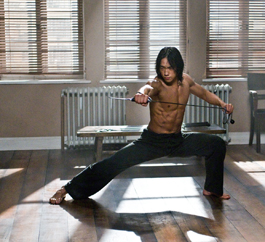home | metro santa cruz index | movies | current reviews | film review

Photograph by Juliana Malucelli
Who'll Stop Rain?: South Korean pop sensation Rain plays rogue ninja Raiko in 'Ninja Assassin.'
Shlock Value
'Ninja Assassin' delivers artful gore and sly references.
By Richard von Busack
THE SHINY Orientalism of Ninja Assassin's dialogue is more of a treat than the fight scenes--which basically consist of a lot of whipping razor chains and puréed ninjas, who go up in what look like explosions in a Ragu factory. The beginning made me nicker like a quarter horse: a tattooist (the great Randall Duk Kim) is hand-poking a squirmy yakuza who won't hold still--this despite his large entourage, the alcohol he's guzzling and the artist's sage comment that "the needle is doing what the needle is meant to do." Reminding the punk that the tattoo he's getting illustrates "one of the four sacred professions of the Book of Five Rings,"the master has to gently wonder if maybe the ink is too noble for the no-good hide.
That's when a messenger delivers a sealed envelope full of black sand. Only the tattooist is wise to its meaning: it is the harbinger of They Who Cannot Be Named, the horror in the shadows. Men? As if! Not men, but masked demons from the depths of hell! Or words to that effect. When the punk yakuza scoffs, the tattooist gravely bares his breast and shows the scar the dreaded ninja gave him years ago--and explains the reason why he lived anyway: an explanation I've loved ever since Dr. Julius No told it to 007.
Unfortunately, this is just the pre-title sequence. James McTeigue, of V for Vendetta, tells of an apostate ninja Raizo (played by the Korean pop star Rain), who turned against the Clan of Black Sand and is hiding in Berlin. There, suffering nobly, he tries to protect an Interpol-like investigator (Naomie Harris) from the wrath of his seemingly hundreds of fellow warriors. In flashbacks, we see the savage training: kidnapped children are beaten into the ninja lifestyle under the glare of Lord Ozuni (venerable martial artist Sho Kosugi).
When McTeigue slows down the camera the violence has an effect, as in his first kill, Raizo's filleting of an Everest-size mofo with a giant Exacto blade. The mofo in question, Stephen Marcus, is named "Kingpin," probably in honor of Daredevil comics, which has hosted its share of ninja activity over the years. And there's the odd sick-artistic effect, like the calligraphy of blood spraying on paper screens, More often, it's more grotty stuff: an edit between a bisected fool and tomato sauce splotching on a paper dish of Berlin-style curlywurst.
The Wachowskis--pedigreed craphounds that they are--developed this comic-book like film. Despite the playfulness of scripters Matthew Sand and J. Michael Stracynzski, the story gets stuck up in origins; the fountains of gore are less nauseating than lulling. Where the movie sings is in its explanations of ninja lore and its occasional borrowing from Ian Fleming--seen here is the "Nightingale Floor" from You Only Live Twice. Scriptwriters and ninjas alike have to respect all traditions. Talking up hooey--creating the theatrical speech that gets an audience fluffed for the supernatural--is a lost art. Every chump with a laptop in Los Angeles is afraid of going over the top, when they really ought to dread going under the bottom.
![]() NINJA ASSASSIN (R; 99 min.), directed by James McTeigue, writtten by Matthew Sand and J. Michael Straczynski, photographed by Karl Walter Lindenlaub and starring Randall Duk Kim, Sho Kosugi and Rain and, opens Friday countywide.
NINJA ASSASSIN (R; 99 min.), directed by James McTeigue, writtten by Matthew Sand and J. Michael Straczynski, photographed by Karl Walter Lindenlaub and starring Randall Duk Kim, Sho Kosugi and Rain and, opens Friday countywide.
Send a letter to the editor about this story.
|
|
|
|
|
|